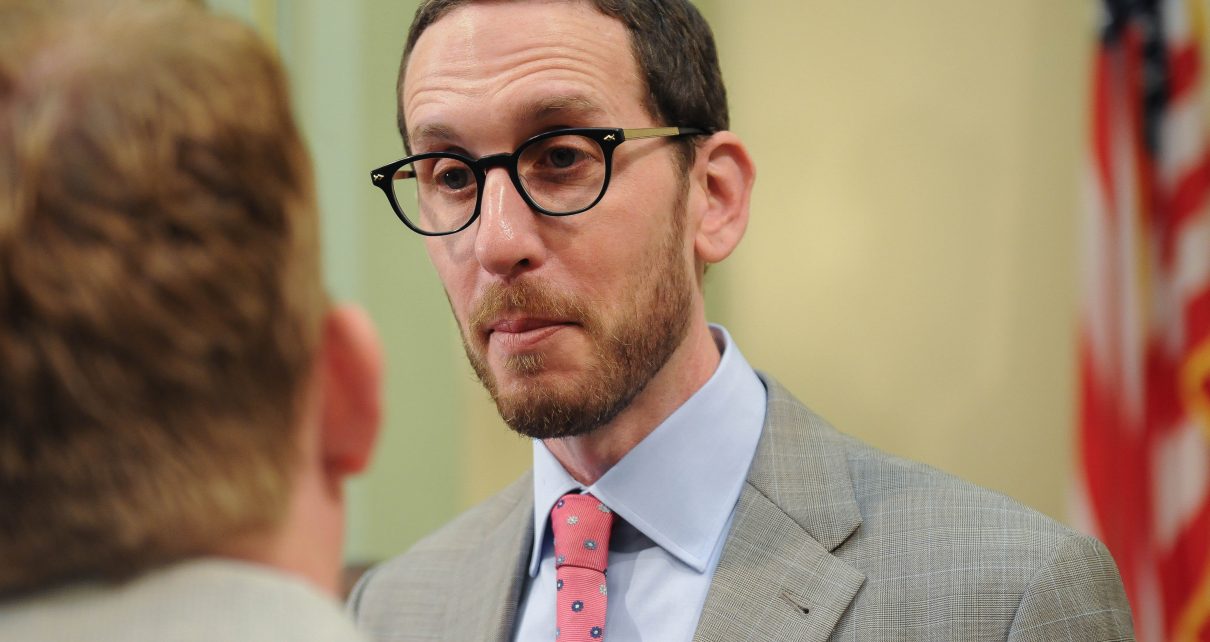
Senator Scott D. Wiener. (Photo: Kevin Sanders for California Globe)
Real Estate Groups and Landlords Will Sue to Stop Bill to Allow Missed Rent Payments
Opposition mounts against SB 939
By Evan Symon, May 28, 2020 2:25 am
‘We have people who rely on us for work. You know, janitors, security, and maintenance staff.’
Real estate groups and landlords are planning to sue to stop a bill that would allow missed rent payments and lease changes. Opposition against Senate Bill 939 has grown significantly this week as California real estate groups and landlords have come out and threatened legal action should it be passed.
Real estate groups landlords threaten legal action if passed
Senate Bill 939, written by Senator Scott Wiener (D-San Francisco), would significantly alter lease and renter obligations across California. According to the bill, small business owners financially hurt by the pandemic would be allowed to renegotiate rent more easily based on how much money they are taking in under the limited coronavirus limitations. Should the renter and landlord not come to a new agreement, the renter could pull out of the lease at any time. Renters would not have to pay all future rents should this happen, but all back rent would have to be legally paid.
All evictions would also be halted until the end of the state lockdown. No publicly traded companies could benefit from SB 939.
While opposition to the bill was noted in Mid-May when the amended bill was brought up to the Assembly, it was brought to a head on Friday during Judiciary Committee testimony.
Rob Lapsley, president of the business lobbying group California Business Roundtable (CBR) said the CBR would sue the state in court to block SB 939 should it pass and be signed into law by the governor. Other business groups came forward with similar support and plans.
“It could cause a financial collapse,” warned California Business Properties Association (CBPA) Vice President of government relations Matthew Hargrove.
The Judiciary Committee itself subsequently passed the bill, but the final tally showed the divisiveness of the bill. 5 Senators voted in favor, 3 abstained, and 1 voted against.
Senator Wiener has argued that SB 939 would allow buildings to keep tenants and allow at least some cash flow to continue but emphasized putting the tenant ahead of the landlord in such decisions.
“We’re at severe risk of mass closure of restaurants, bars & cafes due to social distancing requirements,” said Senator Wiener in a tweet earlier this month. “We can’t let that happen. These businesses play an essential role in our economy & our neighborhoods.”
This week Senator Wiener added that “These landlords aren’t going to be able to collect the pre-COVID rents from these restaurants, bars and cafes. That is not the reality. The choice is not between full rent and reduced rent. The choice is between reduced rent and no rent.”
This explanation has only emboldened many landlords.
Landlords understand reasoning but remain unphased because of dire commercial consequences
“That seemingly makes sense, but our models account for full rent, not half-rent,” said Southern California strip mall owner John Caldwell. “We reduce rent for, say, half of everybody, that’s a 25% reduction in rent coming in. Ballpark. That’s not where our profit margins are at. We lose money on this if SB 939 is passed.”
“So if we don’t agree, we lose a tenant. If we keep them, we won’t be able to make costs, or we severely reduce something like maintenance.”
“If we keep the, we still lose money, but then we can’t get them out as easily.”
“And yes, they will owe any back rent, but it could take a year to get. We have people who rely on us for work. You know, janitors, security, and maintenance staff. There’s also other businesses like pest control and other things we may skimp on, so they’re hurt too.”
“Oh, and since taxes are on the building and property and not businesses, we still have to pay that in full. And those are just some of the costs.”
“How do they expect us to pay a mortgage and all the bills with not enough money coming in.”
“Yes, we get a profit, but we also become a bedrock for these tenants. We give them a home and a place to grow and keep the property tidy and enticing for people to come in. This is crazy to us.”
Landlords also noted the legal action.
“I can’t go into it too much, but we’re looking at it if it’s passed,” noted a landlord in Alameda County who spoke on the condition of anonymity. “I never thought I’d be suing the state, but here we are.”
SB 939 is currently set to be heard before the Senate Appropriations Committee in the coming weeks where it is expected to receive similar resistance from Committee Senators.
- Bill to Require Law Enforcement Disclosure if AI Was Used To Help Write Reports - August 7, 2025
- Gov. Newsom Files FOIA Request To ‘Expose True Cost’ Of L.A. Federal Troop Deployment for Anti-ICE Riots - August 6, 2025
- California Redistricting: How Newsom’s Plan Will Demolish Hard Fought GOP Gains - August 6, 2025








A lease agreement is a legally binding document between the landlord and tenant. I can’t imagine there is any legal principal that would allow the government to unilaterally void such a contract. If they can do this then ALL contracts will be subject to government modification or nullification without the signatories having any say in the matter. Apparently California not longer has the rule of law. More like the rule of Gavin and Weiner.
Yeah, this is 100% a violation of the Contracts Clause of the US Constitution. Probably an illegal “taking” too.
It worries me that the author of the bill “welcomes” the legal challenges. California doesn’t have money to waste litigating obviously unconstitutional bills.
The best way to help these small businesses is to get the economy going by reopening and stopping the fear mongering.
Restaurants have borne the brunt of minimum wage increases, sick leaves, healthcare mandates and soaring rents over last FIVE years and now, COVID-19. Meanwhile, landlords have been gloating over higher cap rates and rising property values. Most of landlord expenses stated above are passed on to tenants through NNN charges. It’s about time landlords share some of the tenants losses!
GODSPEED Mr Weiner!
Punish the landlords and they sell out. Tenants then are left to find other rentals if they can.
JW,
When do the tenants get to share in the landlords losses? Everyone thinks that just because you are a landlord you are an evil rich person. Not true. Being a landlord is like any other business where the goal is to make a profit to pay for your own life expenses. You obviously haven’t a clue how hard and expensive it is to run a business. I can tell, because of your comments “landlord expenses are passed to the tenants” Not true! There is a thing called a rental agreement. In fact, there are many years where my parents made absolutely nothing from their rental property because the tenants destroyed everything-e.g. removed toilets and pissed in the corner of rooms warping the hardwood floors, stealing appliances, letting the entire garden area of the property die, filled the backyard with hundreds of garbage bags, took apart a motorcycle in the living room and drained the oil on the floor- the list can go on. Yet every year property taxes were due, insurance was due, maintenance was due etc. So JW, are you going to pay the 10 months in back rent and the next three years of a lease that my parents’ tenants ran out on and left the building in shambles this month? I think not! You think my parents deserved to have their property treated with such disrespect? You going to foot the legal cost to try and make the tenants adhere to their legal obligations? You going to pay for all my parents personal expenses because they have lost their only form of income? Thank you The Bar Method and the Self Esteem Brand for shirking your lease obligations and leaving my elderly parents in the lurch scrambling to try and make ends meet because their only source of income was lost. An example of the unforeseen legal manipulation corporate tenants are using to get out of paying rent.
Small business owners errantly underestimate the long term futures of their businesses…..paying too much for rent and not factoring in 25% minimum for soft costs of regulation, fees, taxes, benefits, mandates…
The days of gloating over high velocity cash flows without the proper and growing need for expense accruals are over….Leverage is dead…….
Why do Lanlords want the entire rent burden of not by choice resataurnt closure be taken by the tenant that has lost most of his income. At least give the poor tenant a break until half normalcy returns. Otherwise restaurants are going to shut down and economy suffers permanantly. This bill just gives some power to the tennat to negotiate a temporary solution an alternative to the complete shut down.
I totally support Mr. Weiner.natural disaster like COVID-19 tenants/landlords should negotiate put in effort each other because it’s no ones fault last decades commercial rents are so high small business owners been suffering, struggling then pendemic came
Many landlords are not willing to help the small businesss-restaurants. Rent deferments do not help restaurants due to slim margins. Restaurants will have no choice to file bankruptcy which will lead to a financial domino effect any way. That is the truth . Most leases are so strongly favored toward the landlords, small business don’t have a chance if they’re not willing to negotiate. We need help. Small businesses should have an opportunity to renegotiate or get out. Landlord should be able to renegotiate the mortgage. We’ve already billed at the banks.
Many landlords are not willing to help the small businesss-restaurants. Rent deferments do not help restaurants due to slim margins. Restaurants will have no choice to file bankruptcy which will lead to a financial domino effect any way. That is the truth . Most leases are so strongly favored toward the landlords, small business don’t have a chance if they’re not willing to negotiate. We need help. Small businesses should have an opportunity to renegotiate or get out. Landlord should be able to renegotiate the mortgage. We’ve already bailed out the banks. And regarding the contact…. When most of us agreed to the lease it was based on the condition that we would have certain amount of foot traffic. The coronavirus has made it impossible for us to operate due to the restrictions. The act of God clause should be enforced. It’s not fair that leases are written so strongly against the tenants that we can even argue this point without assuming huge legal bills. The cost of the epidemic should be shared among tenant, landlord, banks and government fairly. Why should we have to assume all the costs.